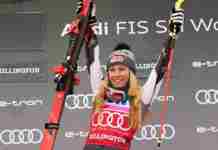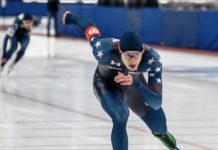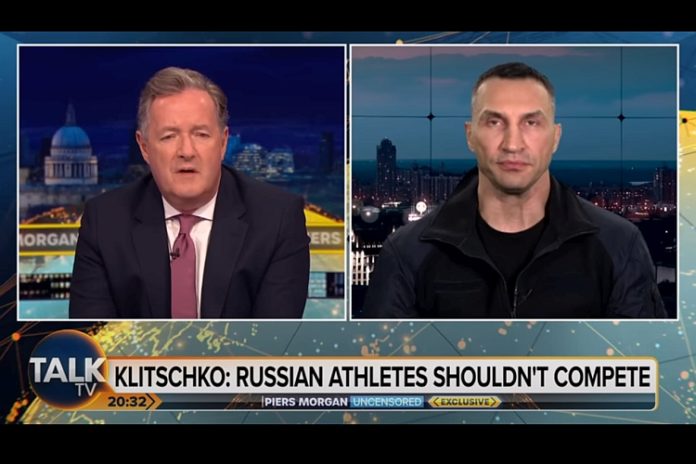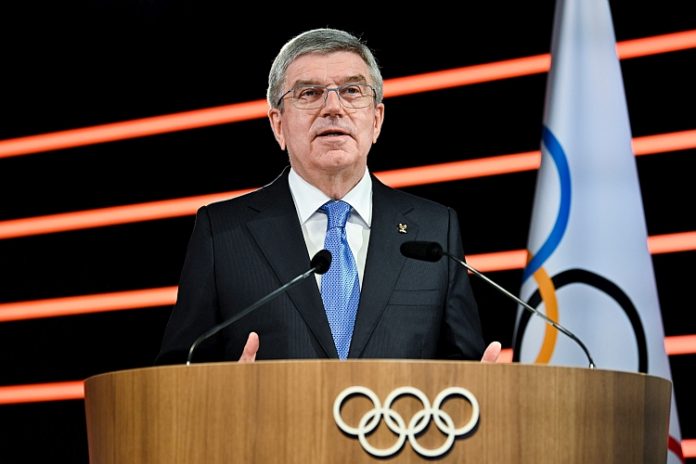● Plus: Tokyo 2020: Men’s 4×100 relay medals reallocated = Paris 2024: Organizers expect to serve 13 million meals = World University Games: All 300 Ekaterinburg staff pink-slipped = National Olympic Committees: New Zealand won 20 medals in Tokyo spending just $12.39 million for the year = Special Olympics: Perth tabbed for 2017 World Games = Anti-Doping: WADA creates athlete council, adds to budget = Aquatics: Tickets on sale for Budapest Worlds and at reasonable prices = Athletics: Houlihan loses Swiss ban appeal = Basketball: Russia explains FIBA ban as protecting Russian team safety = Football: FIFA names officials for Qatar 22, including five from U.S. = Gymnastics: Russian politician calls Kuliak suspension “complete lawlessness” = Skiing: Russia planned events with Belarus and China if further suspended for 2022-23; U.S. Ski & Snowboard awards $250,000 in Shiffrin Athlete Resiliency Fund grants = Swimming: Melbourne to host 2022 Short-Course Worlds = Weightlifting: ITA reports six doping sanctions vs. Egypt = SCOREBOARD => Athletics: Jacobs wins 100 m in outdoor debut = Cycling: Oldani wins final sprint in Giro d’Italia stage 12 ●
Key status updates on the urgent stories in Olympic sport:
≡ SPOTLIGHT ≡
The International Olympic Committee’s Executive Board finalized, in coordination with the Los Angeles 2028 organizers, the criteria by which any additional sports will be evaluated:
“● Prioritising a reduction in the cost and complexity of hosting the Games.
“● Engaging the best athletes and sports that put athlete health and safety first.
“● Recognising global appeal to fans across the world, and host country interest.
“● Prioritising gender equality and youth relevance to engage new fans and athletes.
“● Upholding integrity and fairness to support clean sports.
“● Supporting environmental sustainability to foster long-term sustainability.”
There are loads of sports trying to get in as add-on sports for 2028, led by baseball and softball, which have long histories in Southern California and have Major League Baseball stadiums at the ready to host the tournaments.
The decision on the final LA28 sports program is expected to be made in 2023 and the competition quotas and formats after the Paris 2024 Games.
No announcements were made on the other hot topics facing the IOC, with the final day of the 139th Session coming up tomorrow.
≡ THE 5-RING CIRCUS ≡
● Games of the XXXII Olympiad: Tokyo 2020 ● The IOC Executive Board approved the reallocation of medals for the men’s 4×100 m relay in Athletics, following the disqualification of runner-up Great Britain due to a doping positive for C.J. Ujah.
Canada moves up to silver and China will now get the bronze.
● Games of the XXXIII Olympiad: Paris 2024 ● The FrancsJeux site reported on an 800-days-to-go announcement by the Paris ‘24 organizers concerning food service, no small issue in a country renowned for gastronomy.
A total of 13 million meals is being planned, with 2.2 million in the Olympic Villages, 1.8 million by news media (no estimate of the amount of alcohol to be ingested) and 500,000 by the Olympic Family and guests. The Olympic Villages alone will offer 12 dining facilities.
A commitment to local growers is that 80% of all foodstuffs to be used will come from France, and a quarter of that from within 155 miles of Paris. And to control waste, all of the dishware used for both the Olympic and Paralympic Games will be recyclable.
A nod to the Russian war on Ukraine, from Paris 2024 food service director Philipp Wurz: “We have set ourselves a course, but there are hazards that we cannot control. On the price of wheat, for example, if we take a 60% increase in the figure, we will have to adjust.”
● World University Games ● The reality of the cancellation of the World University Games in Ekaterinburg (RUS) for 2023 – a result of the Russian invasion of Ukraine – has set in. Organizing committee director Alexander Chernov told TASS:
“All 100% of the [300] employees – both my deputies, and IT specialists, and specialists in transport, doping, sports, facilities – all received messages that their labor agreements, which stated that they were invited to work for the Universiade have lost their power because there will be no Games in 2023. It was fair, and in advance, and in accordance with the law. I am proud to work with these people, but for the first time I had to inform so many people that we are through, we will not be engaged in this project for some time.
“I have no doubt that in the very near future we will propose, discuss and plan another, no less interesting and large-scale event, where all these guys and girls will be involved.”
● National Olympic Committees ● Always interesting to see how others do things.
The New Zealand Olympic Committee published its annual report for 2021, which saw the country set a record for the most medals ever won at an Olympic Games with 20 (7-6-7), across 11 sports. That from a country of 5.12 million; New Zealand ranked fifth in most medals per capita in Tokyo and easily the best among countries that won five or more medals.
The New Zealand team for Tokyo totaled 222, with stringent selection criteria; some 93% of the entire team finished in the top 16 in their events and 60% were in the top eight.
A strong promotional program to encourage interest in the Games included some interesting concepts:
● “To connect with fans around New Zealand and showcase some of the new sports on offer, the NZOC built the world’s largest skateboard, at over 12 metres long, and delivered a roadshow programme that visited over 45 towns and cities across New Zealand in 41 days.”
● “JCDecaux digital billboards to deliver a ‘first in New Zealand’ approach where 100+ live updates from Tokyo were broadcast within 30 seconds to members of the New Zealand public nationwide.”
The NZOC spent U.S. $12.39 million in 2021; about 30% of its funding comes from the government, 26% from commercial sponsors and 14% from donations.
How does this compare to the U.S.? Well:
● The U.S. Olympic & Paralympic Committee had a team of 626 athletes in Tokyo and won 113 medals (39-41-33). With a population of 332.9 million, that’s one medal per 2,915,789 people vs. one medal per 254,213 for New Zealand.
● As for finances, the USOPC financials for 2021 aren’t out yet, but the organization spent $272.78 million in the Rio Games year of 2016 and $226.58 million in 2020. If the 2021 expenses were $280 million (a conservative guess), the USOPC “spent” $2,477,876 “per medal” vs. about $619,500 for the NZOC.
Different countries, both with noteworthy results. Interesting, yes?
● Special Olympics ● Australia will stage another significant international event in 2027 as Perth was announced as the preferred site to host the Special Olympics World Games. It will be the first SOWG to be held in the Southern Hemisphere.
Australia will be the seventh country to host the event. It was held in Abu Dhabi (UAE) in 2019 and will be in Berlin (GER) in 2023.
● Anti-Doping ● The World Anti-Doping Agency concluded two days of meetings in Cairo (EGY) with its Foundation Board and Executive Committee, approving governance reforms and increases in its budget for the next three years.
A major issue within the agency has been athlete representation and a 20-member Athlete Council was approved, with five members appointed from the IOC and International Paralympic Committee’s Athlete Commissions, eight athletes elected by the athlete commissions of the International Federations and seven athletes to be appointed by an athlete-majority panel, to ensure specific skills (financial, legal, medical) on the Council.
Athlete representative positions were also added to the Foundation Board and their role was clarified within the Executive Committee.
Budget increases of 8%, 6% and 6% were approved for 2023, 2024, and 2025; the 2022 budget is $46 million U.S., so the targets are now $49.7 million, $52.7 million and $55.8 million.
It was also noted that the testing figures for both in-competition and out-of-competition tests were at or more than the pre-pandemic levels of 2019 for the first quarter of 2022.
● Aquatics ● Tickets for the 2022 FINA World Aquatics Championships in Budapest are now on sale online, with about 180,000 tickets to be sold in three waves.
Despite this being a World Championships, the tickets are very reasonably priced. For the swimming competitions, the morning-session prices are 1,500-3,000-6,000-9,000 Hungarian Forints, which translate to $4.13-8.26-12.39-16.52 U.S.
Afternoon session seats are HUF 5,000-9,000-12,000 and 19,000 for premium seating, translating to U.S. $13.76-24.77-33.03-52.30.
Diving tickets are HUF 1,000-2,000 for the morning sessions and HUF 1,500-3,000 for the afternoon sessions, or $2.75-5.50 and $4.13 and $8.26.
Open-water swimming at Lake Lupa will have a grandstand for just 200 people, with tickets at HUF 3,000 each or U.S. $8.26.
Water polo, which is immensely popular in Hungary, has all-day tickets at HUF 4,000-6,000-8,000 in Szeged ($11.01-16.52-22.02), rising to HUF 5,000-7,000-9,000 for the playoffs ($13.76-19.27-24.77) and then to HUF 6,000-9,000-12,000 for the semis ($11.01-24.77-22.02). The finals in Budapest have tickets at HUF 8,000-16,000-24,000 ($22.02-44.04-66.06).
Debrecen, Sopron and Szeged will host water polo matches, but everything else is in Budapest.
Why Budapest undertook the host this event on short notice – four months – was explained by Hungarian airline Wizz Air chief executive Jozsef Varadi, a member of the organizing committee’s executive board:
“Budapest’s blossoming tourist life suffered a lot in the previous years due to the pandemic, and the World Championships cannot come at a better moment.
“It’s going to be a huge kick for the hoteliers and other service providers and the city can also reposition itself in the global market.”
● Athletics ● U.S. 1,500 m and 5,000 m record holder Shelby Houlihan posted on Instagram:
“Last week, I was informed that I lost my appeals and my ban will be upheld. No reason has been given yet for why they were dismissed. I was told from the start that it was a long shot; it’s extremely hard to overturn these cases and I shouldn’t get my hopes up. I had to try anyway. I had to fight for myself, my career, and my reputation because I am innocent. The truth hasn’t won here and that’s devastating.
“Up until this point, I had been advised to lay low and not say or do anything in order to not jeopardize my appeal process. I think this was best because I also wasn’t ready to talk about it. I needed time for myself to process everything that’s happened and to start working on how to move forward. I appreciate people being understanding and giving me the space for that.
“I do believe that there are flaws in the anti-doping system who’s [sic] unfair practices result in unjust outcomes. I believe it’s broken. I also believe that there are other innocent athletes who have, and will continue to be, affected by this system. This is a problem and it needs to be addressed. I hope as I continue to move forward that I can use my experience to help change it.”
Houlihan will now serve out the remainder of her four-year suspension for doping, due to expire on 13 January 2025.
● Basketball ● The International Basketball Federation (FIBA) removed Russia and Belarus from numerous competitions, including the 2022 Women’s World Cup, 2023 Men’s World Cup and others. The reaction of the Russian Basketball Federation was interesting:
“FIBA’s decision is primarily due to the impossibility of ensuring the safety of Russian teams during international competitions. At the same time, there is no complete disqualification, as happened with the Russian national teams in many other sports.”
Russian federation chief – and former NBA All-Star – Andrey Kirilenko explained:
“We were ready for this decision and expected that our teams would not be able to compete at the world’s largest competitions this year. In the event that the tension decreases by the end of the year, our main goal will be a prompt return. …
“At the moment, the main task is to organize and search for unofficial tournaments for our teams with potentially serious rivals.”
● Football ● Further to Wednesday’s announcement of collective bargaining agreements between U.S. Soccer and the men’s and women’s national teams, just who will benefit from the pooled FIFA World Cup prize money?
The full details of FIFA’s prize purses for the men’s 2022 World Cup in Qatar and the 2023 Women’s World Cup in Australia and New Zealand aren’t available yet, but we do know how much the 2018 men’s and 2019 women’s events paid:
● 2018 FIFA World Cup in Russia:
(32 teams: $400 million total payout)
For the winner: $38 million
For 2nd place: $28 million
For 3rd place: $24 million
For 4th place: $22 million
Quarterfinals: $16 million per team
Round of 16: $12 million per team
Group stage: $8 million per team
The U.S. men’s team did not make it to Russia, so they got nothing. The U.S. did quality for Qatar in 2022, so their prize money will be more than $8 million.
● 2019 FIFA Women’s World Cup in France:
(24 teams: $30 million total payout)
For the winner: $4.0 million
For 2nd place: $2.6 million
For 3rd place: $2.0 million
For 4th place: $1.6 million
Quarterfinals: $1.45 million per team
Round of 16: $1.0 million per team
Group stage: $750,000 per team
There was also “preparation money” for all teams in both World Cups, although the men got more.
So, if this was the 2018-19 prize period, the women would be handing over $2 million to the men. But it’s not, and the prize money will rise to $440 million total in 2022 and more than $60 million for the women in 2023.
Now qualified for Qatar, the U.S. men are in line for about $9 million for the 2022 World Cup and $14 million or so if they can get to the round of 16. For the 2023 Women’s World Cup, the prize money will likely double for the top teams, so another U.S. win could earn perhaps $8 million? The runner-up could earn maybe $5.2 million and $4 million for third (as the U.S. women were at the Tokyo Olympics).
Assuming the U.S. men are strong and earn $14 million for a round-of-16 appearance and the women are first or second, the pool will be $19-22 million and each team will get perhaps $9.5-11 million to split. The men will get less and the women will get more than FIFA will pay them.
The agreement reached on pooling World Cup bonuses is logical on an “equal pay” basis between the U.S. men’s and women’s teams. It only became possible when the women’s Player Association dropped the silly demand that it should be paid the same as the men’s World Cup winner’s share of $38 million. As multiple U.S. Soccer officials noted, that’s a cost the federation could not live with and continue its operations at a high level. A better compromise was found.
¶
FIFA announced the referees, assistant referees and video-review officials for the 2022 FIFA World Cup in Qatar, with Ismail Elfath the only American referee named.
There were 26 referees, 69 assistant refs and 24 video review officials announced, with Americans Kyle Atkins, Kathryn Nesbit and Corey Parker named as assistants and Armando Villareal for video review.
Three of the referees and three of the assistant referees were women, a first for the men’s World Cup.
Massimo Busacca (SUI), FIFA’s Director of Refereeing, noted that the officials will have their own training regiment to prepare for Qatar:
“Thanks to an innovative tracking and support programme, all the match officials can be supervised by FIFA referees’ instructors even more closely and intensively than in previous years. This is a very important factor, from which we expect considerable improvements and progress in view of the FIFA World Cup 2022.
“In addition to that, there will be tailor-made individual programmes, in particular concerning health and fitness. Each match official will be carefully monitored in the next months with a final assessment on technical, physical and medical aspects to be made shortly before the World Cup, in order to have them in the best conditions when the ball starts rolling in Qatar.”
● Gymnastics ● The Russian government was not amused by the sanctions handed down to Ivan Kuliak by the Disciplinary Commission of the Gymnastics Ethics Foundation.
Kuliak was banned for a year for wearing the pro-war symbol “Z” on his uniform during the Artistic Apparatus World Cup in Doha (QAT) last March. On Wednesday, Dmitry Svishchev, Chairman of the State Duma Committee on Physical Culture and Sports, launched into a critique:
“It is surprising for me that several letters of the Latin alphabet were included in the list of prohibited by the international federation and the organizers of the tournament in Doha. When I looked at the regulations, I did not see that they were included in the list of prohibited characters, because of which a person could be sanctioned.
“Therefore, the decision to disqualify, deprive of awards and prize money is a complete lawlessness.
“What is not forbidden is allowed, and I personally don’t see any offensive, discriminatory, nationalist signs in Kuliak’s act, just as the whole normal civilized world doesn’t see it. But, unfortunately, the federation cannot cope with the pressure of politicians, big business tycoons governing the law or lawlessness in sports. She could not withstand the blows, and an athlete who did not compromise himself in any way suffered. At the same time, athletes in other sports can come out with political slogans, and they will not get anything for it.
“If something is not allowed for someone, then everyone cannot do it at sports competitions. But the decision is very tough: it was possible to fine, but disqualification and deprivation of awards is lawlessness.”
The Russian Gymnastics Federation was less aggrieved. Its President, Vassily Titov said:
“We have to look at the text of the decision, there are certain things that do not quite suit us, and then we will make a decision [on appeal]. But the fact that two of our representatives are acquitted suits us. I do not rule out that we will fight, but we may have to agree.”
Coaches Valentina Rodionenko and Igor Kalabushkin also faced sanctions, but were held not responsible by the GEF Disciplinary Commission.
● Skiing ● The Russian Ski Federation is already preparing to be removed from the FIS World Cup for the coming 2022-23 season. Federation head Elena Vyalbe noted:
“The only thing is that if we fail to participate in the World Championships, then we will hold [competitions] together with Belarusians and China within the same time frame, and in general, any athletes who wish to come to us. It is important that athletes compete in these dates, we will not postpone the championship of Russia to an earlier autumn or something else.
“We have plan A and plan B. Plan A, which we planned last year, is being prepared for the World Championships, the World Cup, and, probably, we will go to Finland to skate and we will continue to compete. If this does not happen, then the plan B, and we are starting to improve our competitions. The calendar will not change.”
¶
U.S. Ski & Snowboard announced that $250,000 was raised for the Jeff Shiffrin Athlete Resiliency Fund, from 60 donors, and that 44 athletes – from all USSS disciplines – received grants of up to $13,000.
An anonymous donor pledged matching funds for up to $125,000 in donations and that level was reached; grants to made to athletes from the development level to full-time professionals.
Shiffrin, the father of Alpine star Mikaela Shiffrin, unexpectedly passed away in February 2020. A new round of fund-raising will begin later this year, for awards in 2023.
● Swimming ● Melbourne (AUS) will host the 2022 FINA World Short Course Championship, replacing Kazan (RUS), which was stripped of the event due to the Russian invasion of Ukraine.
The meet in Kazan was scheduled for 17-22 December; the dates for Melbourne are yet to be confirmed.
● Weightlifting ● More doping positives announced by the International Testing Agency, this time six Egyptian lifters for stimulants used during the 2019 African Games in Rabat (MAR).
All six received two-year bans from 22 January 2020 to 21 January 2022 and are now eligible again; none of them competed during the sanction period.
≡ SCOREBOARD ≡
● Athletics ● Italy’s Olympic 100 m champ, Lamont Marcell Jacobs, was back on the track after food poisoning knocked him out of the Kip Keino Classic in Nairobi on 7 May, winning the 100 m at the Citta di Savona meet on Thursday.
He won his heat in 9.99w (+2.3 m/s) and then the final in 10.04, beating Arthur Cisse (CIV: 10.10). Jacobs expects to race next in Eugene at the Prefontaine Classic on 28 May.
Dominica’s Thea LaFond – fourth at the World Indoors this year – got a win in the women’s triple jump at 14.53 m (47-8), the best mark outdoors in 2022.
● Cycling ● Stage 12 of the Giro d’Italia was a nasty, 204 km route from Parma to Genova, with a major climb to the Posso del Bocco over the first half and then two more major climbs in the second half before flattening out to the finish.
Naturally, that meant there would be a sprint finish, this time among Italians Stefano Oldani and Lorenzo Rota and Dutchman Gijs Leemreize, who separated from the field for good with 31 km remaining. It was Oldani who got to the line first, in 4:26:47, just ahead of his countryman, with Leemreize two seconds back.
The main contenders were nine minutes back, and Spain’s Juan Pedro Lopez maintained his 12-second lead over Richard Carapaz (ECU) and Portugal’s Joao Almeida.
● Swimming ● Hot times at the Australian Nationals in Adelaide, including a world record in the men’s 200 m Breaststroke.
That came from Olympic gold medalist Zac Stubblety-Cook, who became the first man under 2:06 with his win in 2:05.95. That erased Russian Anton Chupkov’s mark of 2:06.12 from the 2019 World Championships. Matthew Wilson pushed Stubblety-Cook during the race and ended up second in 2:10.14, no. 20 on the 2022 world list.
That overshadowed the comeback story of teen swimmer Cody Simpson, who became an Australian rock star, but has come back to the pool. Now 25, he finished eighth at Australia’s Tokyo Trials in the 100 m Fly and got on the podium in the event in Adelaide, finishing third in 51.96. He’s on the Commonwealth Games team for sure and could be on the World Championships team; Matthew Temple won the event with Rio Olympic 100 m Free winner Kyle Chalmers second and it’s not clear whether Chalmers will swim this event in Budapest.
Triple Tokyo gold medalist Kaylee McKeown won the women’s 400 m Medley in 4:31.74 to move to no. 2 on the world list for 2022.
The meet continues through Sunday.
You can receive our exclusive TSX Report by e-mail by clicking here. You can also refer a friend by clicking here, and can donate here to keep this site going.
For our updated, 620-event International Sports Calendar for 2022 and beyond, by date and by sport, click here!























